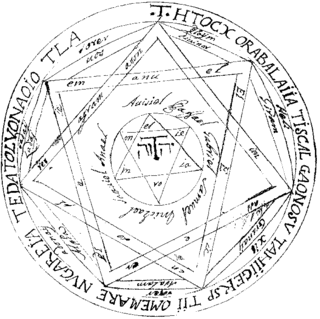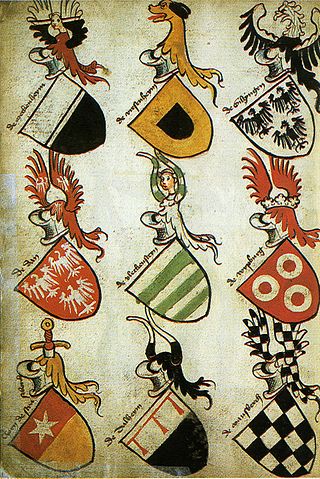
The Catholicon Anglicum is an English-to-Latin bilingual dictionary compiled in the late 15th century.

The Catholicon Anglicum is an English-to-Latin bilingual dictionary compiled in the late 15th century.
The Catholicon Anglicum was written in 1483. [1] Its author was anonymous at the time of its writing in the 15th century, and remains unknown to the present day. From the dialect of English used, the author might have been a native of Yorkshire in the north of England. [2]
The book was republished by the Camden Society in 1882. [3] The dictionary was edited by Sidney Herrtage prior to its republication. [4]
Two copies of the dictionary are known to be still in existence, only one of which is complete. Since 2014, both dictionaries reside in the British Library. The first is incomplete: some of the leaves in this copy are missing. It was purchased by the British Museum in 1846, and was added to the Additional Manuscripts sequence. It is now British Library Add MS 15562. The second, complete dictionary was manuscript no. 168 in the Monson family collection and was collated with Add MS 15562 in a publication by the Camden Society in 1882. This complete version was put up for sale in 2013.
In July 2013, the complete copy of the Catholicon Anglicum, formerly owned by the Monson family, was sold by Sotheby's to a buyer outside of the United Kingdom for £92,500, so an export ban was subsequently placed on the book by then-culture minister Ed Vaizey after a recommendation from the Reviewing Committee on the Export of Works of Art and Objects of Cultural Interest (RCEWA), administered by Arts Council England. [5] The purchase price was eventually matched by the British Library, which purchased the book on 27 February 2014, shortly before the expiration of the ban. It was then added to the Additional Manuscripts sequence, as Add MS 89074.
The Catholicon Anglicum is notable for being one of the earliest dictionaries in the English language. [6] The Oxford English Dictionary stated that many important words in the English language such as diphthong were first attested in the Catholicon Anglicum. [7]
The importance of the Catholicon Anglicum has been described by Ed Vaizey: [8] "The manuscript is of outstanding significance for the history of the English language, which is fundamental to the identity and life of our nation."
Christopher Wright from the RCEWA has said: [9]
This rare survival of a 15th-century English-Latin word list is one of the vital first steps on the road to the English dictionary as we know it today. Its anonymous author, possibly a Yorkshireman on the basis of some dialect words included, provides an invaluable witness to the English language as it existed in the second half of the 15th Century, and can claim an honourable place in the roll of famous lexicographers that stretches through Johnson and Murray into our own age.
— Christopher Wright

A manuscript was, traditionally, any document written by hand or typewritten, as opposed to mechanically printed or reproduced in some indirect or automated way. More recently, the term has come to be understood to further include any written, typed, or word-processed copy of an author's work, as distinguished from the rendition as a printed version of the same.

William Camden was an English antiquarian, historian, topographer, and herald, best known as author of Britannia, the first chorographical survey of the islands of Great Britain and Ireland, and the Annales, the first detailed historical account of the reign of Elizabeth I of England.
This article presents lists of the literary events and publications in the 15th century.

The Key of Solomon is a pseudepigraphical grimoire attributed to King Solomon. It probably dates back to the 14th or 15th century Italian Renaissance. It presents a typical example of Renaissance magic.

The Thomas Fisher Rare Book Library is a library in the University of Toronto, constituting the largest repository of publicly accessible rare books and manuscripts in Canada. The library is also home to the university archives which, in addition to institutional records, also contains the papers of many important Canadian literary figures including Margaret Atwood and Leonard Cohen.

Sir Henry Savile was an English scholar and mathematician, Warden of Merton College, Oxford, and Provost of Eton. He endowed the Savilian chairs of Astronomy and of Geometry at Oxford University, and was one of the scholars who translated the New Testament from Greek into English. He was a Member of the Parliament of England for Bossiney in Cornwall in 1589, and Dunwich in Suffolk in 1593.

A roll of arms is a collection of coats of arms, usually consisting of rows of painted pictures of shields, each shield accompanied by the name of the person bearing the arms.

Bald's Leechbook is an Old English medical text in English and old Latin probably compiled in the mid-tenth century, possibly under the influence of Alfred the Great's educational reforms.

The British Library is a research library in London that is the national library of the United Kingdom. It is one of the largest libraries in the world. It is estimated to contain between 170 and 200 million items from many countries. As a legal deposit library, the British Library receives copies of all books produced in the United Kingdom and Ireland, including a significant proportion of overseas titles distributed in the UK. The Library is a non-departmental public body sponsored by the Department for Digital, Culture, Media and Sport.
Gazophylacium Anglicanum is a dictionary of the English language first published anonymously in London in 1689; gazophylacium is a Latin word, borrowed from Ancient Greek γαζοφυλάκιον, meaning thesaurus.

Robert Glover was an English officer of arms, genealogist and antiquarian in the reign of Elizabeth I. In the College of Arms, he rose to the rank of Somerset Herald of Arms, serving in that capacity from 1571 until his death in 1588. As marshal and deputy to his father-in-law, William Flower, Norroy King of Arms, he participated in heraldic visitations throughout northern England.
I, or i, is the ninth letter and the third vowel letter of the Latin alphabet, used in the modern English alphabet, the alphabets of other western European languages and others worldwide. Its name in English is i, plural ies.
John of Tynemouth was a medieval English chronicler who flourished in the mid-14th century.
Catholicon is a 15th-century dictionary written in Breton, French, and Latin. It is the first Breton dictionary and also the first French dictionary. It contains six thousand entries and was compiled in 1464 by the Breton priest Jehan Lagadeuc. It was printed in 1499 in Tréguier. A manuscript of the dictionary is preserved in the national library in Paris, identified as Latin 7656.
The Promptorium parvulorum is an English-Latin bilingual dictionary that was completed about 1440 AD. It was the first English-to-Latin dictionary. It occupies about 300 printed book pages. Its authorship is attributed to Geoffrey the Grammarian, a friar who lived in Lynn, Norfolk, England.

Marmaduke Rawdon was an English factor and antiquary.
Samuel Norton (1548–1621) was an English country gentleman and alchemist.

Drexel 4180–4185 is a set of six manuscript partbooks copied in Gloucester, England, containing primarily vocal music dating from approximately 1615-1625. Considered one of the most important sources for seventeenth century English secular song, the repertoire included represents a mixture of sacred and secular music, attesting to the partbooks' use for entertainment and pleasure, rather than exclusively for liturgical use.

John Shirley was an author, translator, and scribe. As a scribe of later Middle English literature, he is particularly known for transcribing works by John Lydgate and Geoffrey Chaucer.